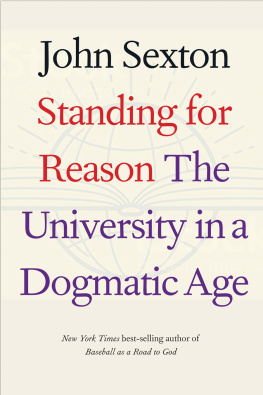Praise for Standing for Reason
John Sexton has been a remarkable university president. The enlightened pages of this book are a product of his thought, experience, and, above all, his passion about the future of universities.
Robert Berdahl, former president of the University of Texas at Austin, the University of California, Berkeley, and the Association of American Universities
Both a memoir of the heart and a call to action of the mind, Standing for Reason vividly reimagines the American university in an era of rising anti-intellectual fervor and the triumph of absolutism over thought. John Sexton, the uniquely passionate teacher who led NYU to the top ranks of the worlds universities, has delivered a must-heed lesson plan for higher education.
Arthur Browne, author and former editor in chief, New York Daily News
In this remarkable book, John Sexton argues that our nation must reclaim the public purposes of higher education. In doing so, he offers a vision of excellence and inclusion that captures the essence, mission, and potential of the twenty-first-century university. This book provides a beautifully reasoned manifesto for the value proposition that a quality education is an investment, not an expense, one that every nation, especially America, must afford if we are to create a better world for all. John calls upon us to combat the marginalization of seriousness and to create a shared global commitment to educational quality for all. And he shows us how this can be done.
Martha Kanter, executive director, College Promise Campaign, and former under secretary, U.S. Department of Education
At a time when higher education and its values are under attack from a broad array of critics, from right-wing legislators wielding budget axes to student activists trying to shut down speakers with opposing views, John Sexton is a sorely needed voice for the idea of liberal arts, research, and independent scholarship. Agree with him or notand consistent with his fifty-year career from high school debate coach to global university president, he makes us thinkStanding for Reason could not have arrived at a more critical moment.
Gara LaMarche, president, Democracy Alliance
John Sexton, one of Americas best known and most accomplished university leaders, helped transform NYU from what was forty years ago a regional university, struggling to survive, into one of the best and most important universities in the world. In his latest book, he asks how universities can help heal the anger and polarization that have become central features of Americas civic culture, and he provides a detailed and compelling answer: Universities must recommit themselves to be centers of open, robust, and even controversial debate, and, by doing so, foster the development of a more informed and collaborative community; they must expand their global reach, as NYU has done with its global network and its new campuses in Abu Dhabi and Shanghai; and, working with government, they must expand access to high-quality higher education for all students. His arguments are thoughtful, carefully examined, and persuasive. If we have the energy and commitment to implement his plans, our universities will lead the way in embracing differences, dialogue, and understanding in a way that our interconnected society desperately needs.
Ted Mitchell, president, American Council on Education
John Sexton, who so ingeniously redefined theological saves and errors in his Baseball as a Road to God, now gives us his latest book, Standing for Reason, in which he argues convincingly that global universities are the last, best sanctuaries for civic and civil discourse and the best incubators for equal opportunity in an ecumenical world. If he can do for global education and equal opportunity what he accomplished for New York University, the world will be a better and fairer place.
Sam Roberts,New York Times
Standing for Reason stands for more than that: It stands for the values of an open mind, of rigorous debate, and helps define the role that colleges and universities can play in a world where knowledge is both created and destroyed with each passing day. John Sexton, in lucid prose, explores the ways the hardening dogmatism of the twenty-first century has led not only to the calcification of opinion but to the increasing substitution of fiction for fact. He calls this phenomenon the rise of secular dogmatism. While he skillfully diagnoses this ill, he also reminds us that the beauty of higher education is that it underpins our ability to push back against dogmatism with reason. There is, in fact, progress to be made in the world, and sustaining it is up to each of us.
Gabrielle Starr, president and professor of English and neuroscience, Pomona College
John Sexton has been teaching, and thinking about teaching, for almost sixty years, and yet he remains young, that is, passionately engaged, open-minded, and original. When he writes of the secular dogmatism that afflicts our age, he does so through vivid memories of his own liberation from dogma at his Jesuit high school. When he insists that it is the universitys highest calling to serve as a sacred space for reasoned discourse, he speaks with the authority of a professor, a dean, and perhaps the most transformative university president of the last generation. When he lays out a vision for the global network university of the future, it is todays New York University, and his own handiwork as president, that he is describing. Sexton has, in short, a hard-earned authority on the great questions of higher education that literally no one else can match.
James Traub, journalist, New York Times and Foreign Policy, and author of several books, most recently John Quincy Adams: Militant Spirit
Standing for Reason

Copyright 2019 by John Sexton.
Foreword copyright 2019 by Gordon Brown.
All rights reserved.
This book may not be reproduced, in whole or in part, including illustrations, in any form (beyond that copying permitted by Sections 107 and 108 of the U.S. Copyright Law and except by reviewers for the public press), without written permission from the publishers.
Yale University Press books may be purchased in quantity for educational, business, or promotional use. For information, please e-mail (U.K. office).
Set in Minion type by IDS Infotech Ltd.
Printed in the United States of America.
Library of Congress Control Number: 2018960094
ISBN 978-0-300-24337-6 (hardcover : alk. paper)
A catalogue record for this book is available from the British Library.
This paper meets the requirements of ANSI/NISO Z39.48-1992 (Permanence of Paper).
10 9 8 7 6 5 4 3 2 1
For Lisa, who formed our world, and
for Jed, Katie, Danielle, Julia, Ava, and Natalie, who sustain it
Contents
Foreword
Gordon Brown
Former Prime Minister of the United Kingdom, and
United Nations Special Envoy for Global Education
John Sextons book is important, and it is timely. In Standing for Reason, one of the worlds most celebrated university presidentswell-known not just on one continent but on all continentshighlights the dangers of a post-truth world where facts and assertion are equated, where the publics confidence in the fundamental institutions of government and society is at an all-time low, and where we are witnessing, in an increasingly pervasive way, the devaluation of thought itself.
In this insightful analysis, John describes these trends, but he does not stop there. He goes on to outline a role for our universities in countering them, and he offers a vision of a new form of university, one pioneered under his leadershipand, if the policy proposals he offers are made law, one that truly will be available to all who deserve it. In doing so, he gives our fragmented world a much-needed message of hope.
Next page







